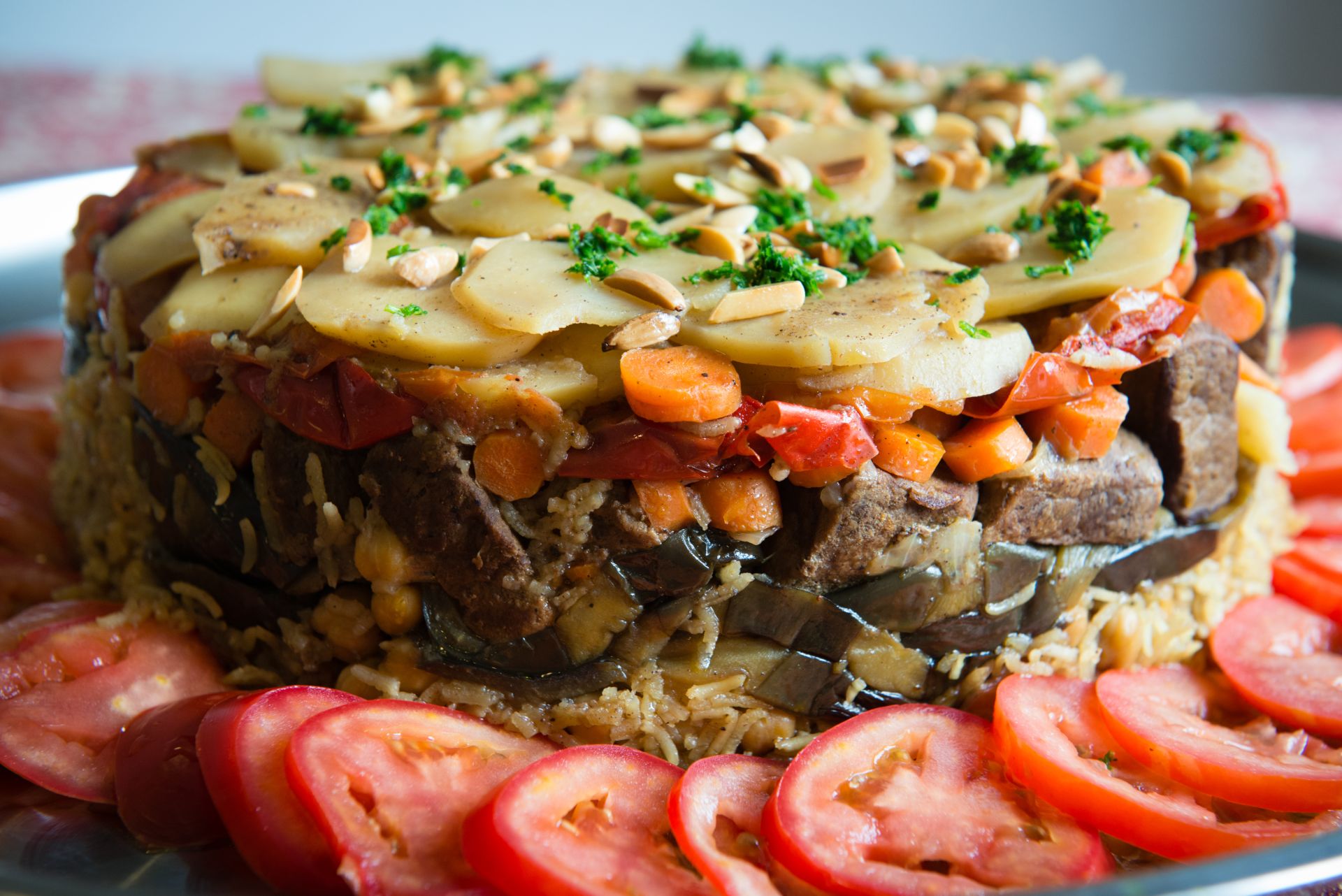Spotlight is a newsletter about underreported cultural trends and news from around the world, emailed to subscribers every Monday. Sign up here.
It’s Muharram, and my Shiite friends who observe the holy month religiously and traditionally never forget to send a generous supply of “qeema,” an Iraqi dish given as alms and one of many rituals to commemorate the martyrdom of Imam al-Hussein, the grandson of the Prophet Muhammad.
It consists of cooked chickpeas and slow-cooked beef, both mashed with fried onion and diced tomato until it achieves a paste-like texture. Dried lemons, salt and black pepper are added to the mixture that simmers for hours in a large pot until the thick stew reaches perfection. Served with basmati rice and no salad, the dish is distributed to friends, family and neighbors on Ashura, the 10th of the Islamic month of Muharram.
Qeema is objectively delicious, and though not a dish that most people would or could eat every day, it is hard to turn it away. In Iraq’s cities of Najaf and Karbala, generous portions of qeema are offered to observers who use the hearty meal as fuel to carry out the physical aspects of Muharram rituals that include hours of walking. For those not participating in Ashura’s physical activities, qeema is a high-calorie, high-carb meal that induces a food coma. We regret nothing.
It’s perhaps also worth talking more about Arab cuisine given the recent attention it has garnered in the press following a report on obesity in the Middle East. Despite the increased scrutiny, there are dishes we are unlikely to forsake. (Disclaimer: These are foods I am familiar with and do not reflect the vibrant cuisines of the entire Middle East and North Africa region for which I am not an expert. Apologies in advance to North Africa.)
Food patterns in Arab-majority countries draw on influences from the rich cuisines of India, Persia and the Ottoman Empire. The latter includes foods from Greece, Azerbaijan, Armenia, Georgia and other former Ottoman regions. There are unique cooking principles that vary depending on the geographical proximity of the influencing culture.
Iraqi cuisine, for example, is the true definition of “salt, fat, acid, fire.” Many Arabs find Iraqi dishes bland, and there is partial truth to that. Little to no spices are used in Iraq’s most recognizable dishes, and this fact is more evident in the areas closest to Turkey. The philosophy behind it is that high-quality ingredients, mostly meat, seasonal vegetables, and rice, should not be overcome by strong spices. Salt and acid in the form of dried lemons, citric acid or sumac are enough to bring out the flavor. A yearlong staple on Iraqi tables is rice and a tomato-based vegetable stew cooked with meat. A relatively new dish given the contemporary inclusion of tomato, the origins of this dish can be traced back to India and Persia but with fewer spices used.
As we move toward southern Iraq, the influences of those cultures are reflected in more flavorful stews that incorporate a greater amount of turmeric and curry than their northern counterparts. The Indian influence on Saudi and Yemeni cuisines, the two most overlooked and underrated in my opinion, is also evident. Combining unique slow-cooking methods and India’s luxurious spices, the results are mouthwatering to say the least.
Cruising toward the Levant we find variations of dishes found elsewhere, but with lighter, zestier twists. Dairy, yogurt to be specific, is dominant as a marinade and part of the main course. Levantine grilled chicken is unparalleled. The variations of “kibbeh,” a dish based on ground meat, grain and onions, took what was introduced by the Ottomans and claimed it as a product of the Levant. The “stuffing” method of cooking is nonnative to Arab-majority regions and can be traced back to Greece, Armenia and Eastern Europe. The Levantines upgraded the bulgur shells with spices and perfected the minced beef stuffing with the addition of pine seeds.
Then there is “maqlooba,” which translates to “upside down.” No, not the creepy parallel dimension in the TV program “Stranger Things,” but rather a different kind of dimension, the closest one to paradise. Native Palestinians thought this one through, and to them we are grateful. Fried or sauteed eggplant, potato, tomato, bell pepper and onions arranged in a deep pot as the base with spiced rice cooked al dente added in layers alternating with the remaining vegetables and optional chunks of meat. Simmered till the rice is fully cooked and fluffy, the pot is then flipped upside down, to create a low-rise rice cylinder topped with juicy, oozing vegetables.
An ex-friend once complained that “Koshari” was an “unintelligent” dish. Yes, an “ex” friend. No friendship is worth saving after such a statement. It consists of layered cooked green lentils, chickpeas, vermicelli and elbow noodles, and rice topped with thinly sliced, fried till crisp onions and a tomato sauce. Imagine your soul leaving your body to transport you to carb heaven — that is Koshari. The beloved Egyptian dish was initially widespread among poorer families because of the low cost of its dry ingredients, but its appeal transcends class, region and universes.
The best thing about the local cuisine in Arab-majority countries is that you can count the ingredients using your fingers. There are almost no heavily processed elements that were manufactured with additives that read like a chemistry textbook. Recent studies show that processed foods are the most damaging to our health because the human body does not recognize it as food but rather as toxins that it struggles to get rid of. I will take the extra few pounds of body fat over chemicals, thank you. Between ingredients I cannot read and qeema, I choose my qeema with a serving of basmati rice. Make it two servings, please.



